The Video Coverage
“Hey Bill, BDM is out with pneumonia and Randy has Hasbro stuff to deal with this weekend, so we want you on video coverage.” That wasn’t quite how I was thrust from being a laptop-jockey in the feature match area to the straight man to Rich Hagon color, but it kind of felt like it. Headed to the event I was expecting to work in much the same capacity as I had during the previous Pro Tours I had been involved with. Do some feature match coverage, write some blogs, interview a few players. When Rich revealed BDM and Randy were both out for the weekend, however, I became excited at the prospect of working with the video team for 72 hours.
As it worked out, things went pretty well. I was selected to fill in temporarily with Rich for Randy and Brian, and we managed to get through the weekend without destroying Magic. I’ll leave comments on performances to the critics (actual quote, supplied unedited: “I wan’t to kick Bill Stark in his cabesa!!!”); I’m just happy Rich and I managed to get through the weekend without any disasters happening.
Speaking of Rich, how professional is that guy? As an I-do-this-for-a-living entertainer he knew his stuff coming into the event, and really went beyond the pale to make sure things went well. Before each Tournament Center he would write up an approximate script which we would review to make sure we knew what things we wanted to cover and where he was going to pitch to me for comment. That was immensely helpful in providing me with some lead time to make sure I had some formulated thoughts before Rich simply said “Bill, your thoughts on Amiel Tenenbaum?” to be met with me mumbling to the conclusion “Um…he’s French?”
We also seemed to build a pretty good camaraderie that kept us from talking over one another and was particularly useful in the booth during the Top 8. Readers/viewers at home don’t realize the two of us are playing specific roles as announcers, much like the teams you see covering professional sporting events. It was Rich’s responsibility to provide some flavor and color to broadcasts, occasionally being a goofball, and serving as lead talker while I relied on my background in journalism and my connections in the professional community to provide insights into the format, the game, and the communities represented at the event. Sometimes these things overlapped, but for the most part we stuck to our roles, and things (I felt) flowed smoothly as a result. Sure, some people think we need more or less of that type of thing in the game (“Why is Bill explaining what reach is for goodness sake. The people watching the webcast KNOW what reach is.” Or “OMG WTF ARE THEY ‘SINGING’????!!!!”), but at the end of the day I felt the mix was relatively good. Probably not perfect, but what is these days?
In any case, if you have specific comments on the coverage, Rich, or myself, I would encourage you to say something in the forums or to email me. I’m excited to see Randy and BDM back in the booth for Hollywood, barring any unforeseen circumstances, but I’m a big fan of self-improvement and always appreciate honest feedback.
Of course, I don’t think I’d ever pass on the chance to work with Rich in the booth again. That man is truly one of a kind.
The Return of Jon Finkel
I don’t talk about my personal life in articles very often. I think it’s a bit tawdry; we’re here to discuss Magic, not who’s dating who or whatever. Still, to illustrate the impact of Jon Finkel on Magic, I thought this anecdote might be useful.
I’ve been dating my girlfriend Jess for just over two years. Magic is obviously a big part of my life, and I’m the type of guy who brings it up on the first date (or more accurately am known as a Magic player publicly), but to really legitimize it to Jess at the start of our relationship I did what any reasonable minded person would do: I gave her “Jonny Magic and the Card Shark Kids” to read. Jess is a real sweetheart in that she watches the coverage I’m involved with, follows the events I compete in, and even feeds the Iowans who come over to my place to test for the Pro Tour (ask the Iowans who Q’ed for Valencia; average caloric intake at my apartment the weekend we got together was somewhere upwards of 4,000). Still, the only pro player she truly recognizes is Jon Finkel himself; while she might understand that other players are good, she couldn’t pick Kai Budde or Kenji Tsumura out of a lineup filled with McDonalds characters. So imagine my surprise when I got this email from her Monday morning after the Pro Tour ended:
“I’m not going to lie… for one twinge of a moment, Jon became my inspiration to start playing Magic thinking ‘I could do that. I could be that good.'”
Jess might be a gamer at heart in that she’s always up for some Monopoly, Apples to Apples, or maybe even Risk, but she’s never so much as untapped a single basic land or rolled a D20. Her only connection to the game is me and, by way of David Kushner’s book, Jon Finkel… and when he wins, a person with no reason or inclination to play Magic: the Gathering starts to think “Man, why am I working a 9-5 when Jon makes Magic look so easy?”
That’s the impact Jon Finkel has on Magic, and I think there is a world of Magic players positively delighted to see him back on top of the game. And, wow is he on top. Sure, he won the Pro Tour, but he won it in overwhelming fashion. Throughout the 72 hours of competition he had but a single loss (to Masashiro Kuroda) and one draw, which was intentional. That means he was still playing rounds after he could have started IDing into the Top 8. Why did he keep playing? Ostensibly to help out guys like Nicolai Herzog and Mike Hron, both players he knew from the old days, but one can’t help but wonder if perhaps he just loves to play. He also sat down to play against the Spanish player Joel Calafell in the final round. Shocked, Calafell said something along the lines of “Listen, you really want to ID with me. I’ll make Top 8.” Undeterred, Jon kept shuffling to which Calafell responded, “Listen, have you ever heard of me? I’m telling you, you want me in the Top 8.” That seemed to speak to Jon’s practical sensibilities, and he opted for the draw that allowed the Spaniard his shot at Sunday glory.
Jon claimed during a feature match with Paul Cheon, who predicted Jonny Magic would win the whole thing during said match, that if he won he would attend Pro Tour: Hollywood. Will he stay true to his word? I’m certainly looking forward to finding out, and I truly believe you couldn’t have scripted a better ending to Pro Tour: Kuala Lumpur.
Revisiting Malaysia as a PT Stop
Players have a tendency to complain (myself included). So it came as no surprise that they were pretty upset when they found out their reigning World Champion wouldn’t be attending Pro Tour: Kuala Lumpur, though he was able to. I went into detail about why I think KL made for a good PT stop last week, but I want to touch on the subject again a bit this weekend to make it more clear to players how difficult getting to any Pro Tour can be.
First, it should be noted that Pro Tour locations are selected months in advance of the actual event. For those of you under the impression that the person in charge of selecting Malaysia for this Pro Tour was hiding behind the stage at Worlds waiting to get word on who was going to win so that they could pick a location that would be challenging for said winner to attend… well, you’re being a bit paranoid. Kuala Lumpur, as I understand it, wasn’t even the first selection for the Pro Tour; originally Singapore was the choice, but a silent coup amongst government officials forced organizers to select a more stable location, though Thailand did remain relatively stable throughout the “political upheaval.” In reality, no matter where Wizards hosts a Pro Tour, some players will not be able to make it. Ask any player from the Philippines or other second world countries who try to get into the U.S. with the following line:
“Hi, I’d like admittance into your country? I’m 21, I own no house, I’m not married, I don’t have a career oriented job, children, or any ties that would keep me in a country with a GDP considerably less than yours, but I promise I’ll be leaving after just one week.”
Not happening, the U.S. is simply far too xenophobic (better luck next time Mr. Filipino World Champion). Or how about a Russian trying to get into Japan? Unlikely, as the Japanese are still pretty pissed off over the whole Kurile island business. I mean, seriously Russia. You’re huge, Japan is small, give them back their Islands! Then maybe Nicolai Potovin can win the next PT there.
At the end of the day, there is no location on the face of this planet which allows every single person from every single country to freely enter and leave as they see fit regardless of stature in life. This time it just happens to be that a World Champion (and 12 months ago “Israeli World Champion,” fair or not, was a pretty unbelievable concept) was excluded instead of “faceless Filipino/Russian/random,” but it seems remiss for the added visibility of a player like Uri Peleg to unfairly provide Wizards-bashing for something that happens at every event. Maybe we should examine why a Muslim government would have problems with Israel, why Russia and Japan can’t just get along, and why America is so terrified of immigrants instead of why >1% of players can’t attend any single Pro Tour?
The Players Meeting/Chris Galvin Q and A
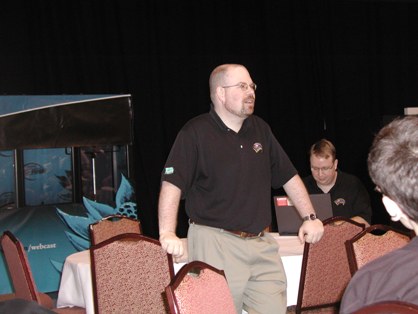
Chris Galvin tackles some tough questions at the Q and A.
My name is Bill Stark. I am not a Wizards of the Coast employee. I do not receive a salary from them, they do not provide me with health benefits, and I am not on their payroll. I am, however, an independent contractor for Wizards of the Coast meaning that from time to time they contract me to do work for them (to date event coverage work). As a journalist I recognize that this may inherently bias me regarding my point of view on subjects pertaining to Wizards of the Coast, and I feel as a reader you should be aware of this.
Moving on, I must regretfully admit that I was very disappointed in the Chris Galvin Q and A session, but not for the reasons you might think. As an independent contractor since July ’07 I’ve gotten to work hand in hand with many Wizards employees I didn’t know a year ago, including Chris Galvin. That makes a huge difference in how I perceive the company, as it is no longer a faceless corporation filled with cogs who make the game we all love and cherish, but an actual organization with human beings I know and interact with who have demonstrated over and over again their dedication to the game, the Pro Tour, and continuing to make a product we all know and love (that they know and love). You don’t need to see many side drafts filled with Wizards of the Coast staff members at events like Kuala Lumpur to recognize that they love them some Magic too.
So what was so disappointing about the meeting with Chris Galvin? Not the number of Wizards staff present; there were close to a dozen, though Scott Larabee, Scott Johns, and Chris Galvin did most of the talking. Was it the type of answers they provided? Not at all; each Wizards representative who spoke was remarkably candid, Chris Galvin in particular, and while I recognize there are specific details of corporate information they were not able to reveal due to company policy, I felt Galvin stretched those boundaries as far as he could to provide as much information as possible. So what portion of the event was I disappointed in? Unquestionably the players.
To be fair, Luis Scot-Vargas, Raphael Levy, Ruud Warmenhoven, and Paolo Vitor Dama Da Rosa met with Chris Galvin the evening before the public meeting took place. I was not privy to the things they discussed, but in calling players out it’s only fair to point out they had a private consultation that came to whatever end it came to. However, the actual public meeting was attended by just 30-40 players, many PTQers from the Midwest, and all of this despite the fact I personally attempted to wrangle top-level players to join the meeting before it started in an effort to increase participation. Tiago Chan, Amiel Tenenbaum, and Paul Cheon? Too busy moneydrafting (though Jacob van Lunen finished his match in the same draft and came over). The player’s union? Did not feel it was necessary to show up after their private meeting the evening beforehand. In all, nearly every single group of players I spoke with refused to participate in the meeting, giving excuses that ranged from the lethargic (“What good will it do anyway? Wizards is a huge corporation!”) to the ridiculous (“Wizards should have scheduled it at a better time!” or “But I’m drafting!” despite the fact the event was publicly scheduled for the end of the first day of competition and players were more than aware of this headed into the weekend). The mood was disgusting, and as a player I have never been so ashamed of a group which I identify with as I was that day.
Think about the opportunity at hand. Chris Galvin, the Vice President of Organized play for Magic: the Gathering, agreeing to have eggs and tomatoes thrown at him for over an hour by players who have publicly voiced concerns over some of his decisions on message boards around the world. Perhaps people don’t understand the hierarchy at Wizards. At the very top is the CEO, slightly beneath him is the CFO, and at approximately second-and-a-half in command is a series of vice presidents, like Chris Galvin, who oversee all that goes on within the company. Considering Galvin’s position holding most of the corporate purse strings within the company, one can only imagine he must be very high on that pecking order, and having the chance to speak with the third-in-command at the company that makes your favorite products is special to say the least. Do we as a community believe Fortune 500 VPs ever do anything similar? Hardly. They answer to stockholders and the board, and the thought of Microsoft’s Steve Ballmer agreeing to a Q and A with the suckers who bought Windows Vista first gen is laughable (although if anyone knows of a time/place where he is doing that, send me an email; I have a few concerns to voice).
The reality is the changes made to the organized play programs by Wizards of the Coast were scary. It was the first time in my 13 year history with the game in which I actually, for a split second, thought “Uh oh, what is Wizards doing?” Not alone in that thought, the Net positively teemed with similar sentiments, but when push came to shove, most of the voices with the opportunity to take advantage of the Wizards response to those calls… didn’t. They just stone cold didn’t, and in my mind lost the ability for me to ever care about what they have to say on the matter. Don’t like your PT Lounge being taken away? Too bad. Disappointed you don’t have 15 Pro Tours to play each year so you can support yourself on Magic instead of a 9-5 like most every other human being on the planet? Don’t care. Every single player at that event who opted to keep drafting instead of showing up to the meeting, every “Pro Tour All Star” who could find room to complain after being given the opportunity to sit down with the Vice President of Organized Play, every person who decided there was simply nothing they could do without taking the opportunity to find out for certain… forget you.
Of course, it’s not all doom and gloom. There were a number of players who decided to participate, including some famous pros and at least three Pro Tour Champions. In no particular order, here is a list of players I saw at the meeting (though it is not complete by any means):
Sam Black
Mike Hron
John Sittner
Mike Thompson
Brandon Scheel
Gaudenis Vidugiris
Matt “Cheeks” Hansen
Zac Hill
Zvi Mowshowitz
Steve Sadin
Bram Snepvangers
Nate Siftar
Steve Locke
Jacob Van Lunen
Rasmus “Big Oots” Sibast
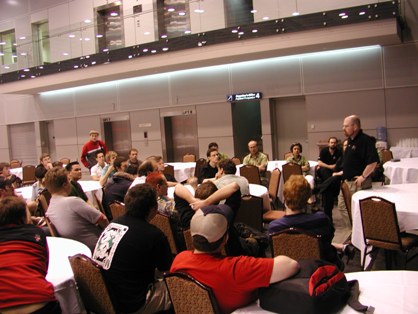
Players who participated in the Q and A with Wizards staff
Whatever your impression of the player’s meeting, the Wizards announcement, or pro players in general, each person who sat down at that meeting gained a level of respect from me which they would not have gotten otherwise. In the face of overwhelming resistance from their peers, they decided they were going to take advantage of the opportunity given to them and find out what was going on at Wizards of the Coast, what had happened to their Pro Tour, and what the future was going to hold. Gentleman, kudos to each and every one of you (and again, this list is not comprehensive; if you attended the meeting, I encourage you to sound off in the forums attached to this article saying so).
So what was discussed, and is Magic dying? The answer, unequivocally, is no. One of the most important messages Chris Galvin tried to convey was that the budget changes for the Organized Play programs did not come from some faceless Hasbro executive hellbent on cutting costs due to lead recalls in the Polly Prissypants Pocket Oven by taking a dump on other, successful brands. And Magic is successful, a Top 10 or Top 5 brand for Hasbro, according to Wizards staff. Instead, the budget re-allocations came directly from Galvin himself, and he repeatedly stepped up to the plate on the fact, plainly stating for all that he accepted all criticisms of the changes and that players who were concerned should be blaming him and no one else. That takes some guts.
So why did they cut the programs, and is the Pro Tour dying? Galvin stated that Wizards was dedicated to maintaining the Pro Tour for Magic: the Gathering and would continue to do so, and that Richard Garfield’s image of intellectual sports like Magic drawing comparisons to sports like baseball and basketball would continue to live on. He did point out that a Pro Tour was cut for the year, though much of the money was allocated to an increase in the Grand Prix prize structure, but that the Pro Tour has ebbed and flowed throughout its existence, ranging from 3-5 Pro Tours and a World Championships since 1995, when it began. Rich Hagon, watching from the peanut gallery, pointed out as well that the Pro Tour occasionally changes for the betterment of players, including the addition of the pro player’s club and its re-organization after its first year to adjust the level of players at levels 2, 3, and 4 upwards.
But for those at home, the true concern for the changes from OP were likely why States and the MSS were cut. Galvin, who created States and referred to it as “his baby” on several occasions, pointed out that in any given year, Wizards runs X tournaments (he couldn’t give an exact figure, but a projection he used as a placeholder was 250,000-300,000). Of the players who play those tournaments, only about 3-5% are involved with the MSS and the State Championships, and despite reconfiguration of those programs and tinkering over the years they have consistently disappointed Organized Play, until this year when the decision was finally made to simply cut them altogether. While small in number, it seems plain that the people who enjoyed those tournament circuits, myself amongst them, were fervent in support of them, and it’s understandable that they were upset when the programs were cut. At the end of the day, however, OP is working on replacement programs for States and the MSS that will seek to improve participation and be better than what has been offered before.
That assertion quickly brought forth questions from the audience about why Wizards had to cut the programs before replacements were in effect to fall back on. A reasonable line of questioning, and Galvin responded by pointing out that each staff member he tasked to work on States was a staff member that wasn’t working on States 2.0, which inevitably slows the process of improving the programs, and that simply wasn’t something they could afford to do. There were some voiced complaints that it couldn’t take that many personnel hours to manage States, but Rene Roub, director of organized play events, interceded to point out that organizing States was indeed a full-time job, and for multiple people. Pull them from developing States 2.0 to keep running States 1.0 and the new program remains a pipe dream.
The final concern addressed, and by Steve Sadin who is a great poster child for it, was what Wizards could do to improve the pace of announcements so that pro level changes could be received by those they affected in time to matter. The conclusion, after some excited discussion, was that there really was nothing Wizards could do to post announcements sooner. Indeed, Galvin pointed out that they made the pro level announcements as soon as the new system was determined, immediately passing on the news to players because of its high relevance. At the end of the day, corporate budgeting from Hasbro prevents a Pro Tour schedule conducive to publicly announcing pro structure changes in an early fashion. This was probably the most unfortunate announcement as, when it all boils down, the Pro Tour is awesome but it’s not a guarantee. Wizards will do what it can to ensure a Level 4 pro like Steve Sadin, who travels to Australia for a GP to pick up the final few points he needs to level up, will get what they have coming to them. Unfortunately they can’t guarantee it, and sometimes the cookie will crumble the wrong way just as it occasionally crumbles the right way.
I don’t feel Magic is in trouble. On the contrary, I feel it is on the verge of some very big things with the OP programs that will (hopefully) build the game in new ways. Chris Galvin and company are intent on making Magic bigger, not smaller, and the changes they’ve recently announced were with that in mind. Chris actually had a really good quote, something to the effect of “These changes represent the best thinking of the business people who have brought Magic and the Pro Tour this far.” The business people who created the PT, the Master’s Series, the end of year payouts, the pro player’s club, the plane tickets for PTQ winners. Those people. They are intent on taking tournament participation and making it bigger. Intent on bringing more money into the game and on new fronts, and doing so at the grass roots level. When 250,000 tournaments a year becomes 400,000, then 500,000, then 600,000, where do you think the extra revenue and player stream is going to flow? The answer: upwards, and while we may be down a Pro Tour now, if Wizards is as successful with their new efforts as I believe they can be, we may see a season very soon up one or more Pro Tours, complete with the player’s lounge and new, exciting features on the pro front that we’ve never seen before.
But if you don’t want to wait for change, don’t. You can do something about things right now, and all Wizards staff present made that very clear. They want to hear from you. They want to know what suggestions you have to make their products and programs better, and they’ve listened in the past. The Last Chance Qualifier? That was a suggestion made by pros years ago, and it worked. So if you want to improve things, talk to Scott Larabee or Chris Galvin at your next premier Magic event in your area (they’re often at Pro Tours, Worlds, and occasionally Nationals and Grand Prix tournaments). Not hosting one of those events in your area for a while? Give them an email! You can contact Scott Larabee right now at [email protected]. Furthermore, get active on their message boards. Wizards staff check those things constantly, and your voice is heard when you speak there. I believe things are going to get even better with Magic, but if you don’t, you can do something about it! If nothing else, that’s the most important thing the Q and A session leaves us with.
Japan at the PT
When Rich Hagon asked me to pick a virtual Top 8 prior to the Pro Tour, I quickly set about coming up with a configuration that looked something like this: 3 Japanese players, 2 Americans, 1 French, and 2 “other European.” At the end of Saturday play, however, the world was shocked to see the highest finishing player from the Land of the Rising Sun down in the double digits; Japan had not had a good weekend.
Is there a specific cause for this? I don’t think so. The big Japanese names were all there, but sometimes you just have a rough weekend. This was that weekend for the Japanese, and while they didn’t have a Pro Tour champion during the 2007 season, they were consistent high-place finishers as usual (making up half of the Top 8 in San Diego alone). America, which had its best season in recent memory, took two champion slots in San Diego and Geneva despite being relatively under-represented in Top 8s throughout the year. Sometimes things just fall your way, and they’re falling America’s way right now (though there’s something to be said for the fact Americans seem to excel at Limited events as opposed to Constructed).
Japanese Magic isn’t dead, dying, or stagnating, though it is going through some changes. Some of its biggest names are having to face the music regarding life responsibilities, but I expect that by the end of the season we’ll see a high percentage of Japanese players playing on Sunday if we don’t crown one of them champion outright.
How sick is Ron Foster?
For those of you who don’t know him, Ron Foster is the Organized Play manager of events in Asia. He is also fluent in Japanese and Spanish in addition to English, and the best person ever to have with you in Tokyo Narita airport when you’re stuck trying to buy a replacement ticket for the one you lost when you were sick in Kuala Lumpur. I know this because 24 hours ago (as I write this) that was me with Ron, grateful that my traveling companion for a short leg of my trip was not only fluent in the local tongue but also in Tokyo Narita Airport after living in the region for years.
We spent the day enjoying local cuisine (we had a 9 something hour layover), picking up some things for Ron’s family at home, running back and forth between ticket counters to figure out what was going on with me leaving the country, and chatting about life, Magic, and the Pro Tour. Ron, like most of his colleagues, is as hellbent as anyone on keeping Magic and the Pro Tour successful, but it was nice to get a different take on things, particularly from someone so versed in the Japanese community’s workings. He also added that it was difficult to get the Japanese players to the Q and A because they knew they weren’t going to understand, verbatim, what was happening.
Our discussion hit a number of topics over breakfast, but it got really fascinating when we started talking about the Kamigawa block and story elements of the set, which Foster helped with. Now I’m not much for the flavor of Magic sets, consciously at least. I think it’s neat, and necessary, but I don’t care if Gerrard saves the day, if Urza resurrects his brother, or if Squee inadvertently blows up the HMS Titanic by passing gas too close to a Goblin Grenade/Time Bomb/Super Duper Whatever.com. Just tell me what the card representations of those actions do and I’m happy as a pig in… well, you know.
Still, as Ron explained the fundamental elements of the Japanese language to me (ever wonder why no Japanese word ends in a consonant unless that consonant is “N”?), it became apparent how much effort the flavor team had put into Kamigawa block. Take the Snake people, for example. It never occurred to me that Seshiro, Sachi, Sosuke, and company all had names that focused on the letter “S” because they were snakes. “Think about it,” Ron explained. “A group of Snake people gradually evolved into humanoids who could talk. But they’re still snakes, so when they speak they ‘ssssssss’.” Ssssessshiro, Ssssosssuke, Ssssachi. These are the names of sentient snake beings who appropriated language to themselves but not without their own snakey touch.
The list of “neat” stuff Ron talked about regarding flavor blew my mind and by the time we parted ways at Seatac airport in Seattle/Tacoma, Washington, I had a newfound respect for the people working behind the scenes to make sure Magic is fun for the non-cutthroat amongst us. If they put that much thought and effort into the names of Snake people from a three-set block, think how much time and effort the company is putting into… oh, say, new Organized Play programs to replace States and the MSS.
In any case, I’m not sure I would have had such an enjoyable time in Tokyo if not for Mr. Foster, and I’m truly indebted to him.
The Next Leg of Travels
I left Kuala Lumpur, an amazing Pro Tour, my friends from Belgium and the rest of the world (Zac Hill, Grgur Petric, Tine Rus, etc.), and am now writing in the lobby of my hotel right next door to the Wizards corporate offices, where I got a guided tour yesterday (sorry, no pictures due to company policy). The next leg of my journey will take me first to Aberdeen, Washington, where I’ll reunite with old friends Ben Torgerson and Chris Crile, players who truly taught me how to play Magic in college, and we’ll journey to the Grand Prix in Vancouver together. Ben and Crile will be playing while I’ll be doing coverage for the event. Vancouver is a beautiful city and the event will hopefully give Extended the shot in the arm it needs, as it has begun stagnating midway through the PTQ season. I’m excited for that leg, but a bit nostalgic over my first trip to Asia. Even short an event this year, the Pro Tour is truly a wonderful thing and I think every player owes it to themselves to get there at least once. The friends you make, the places you go, and the experiences you have are unlike any you get doing anything else in the world. I’m looking forward to Vancouver, but I can’t wait until Hollywood…
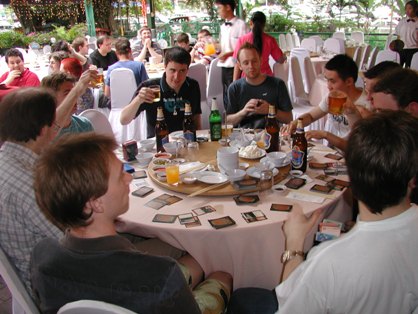
Players enjoying the player’s dinner prior to the main event.
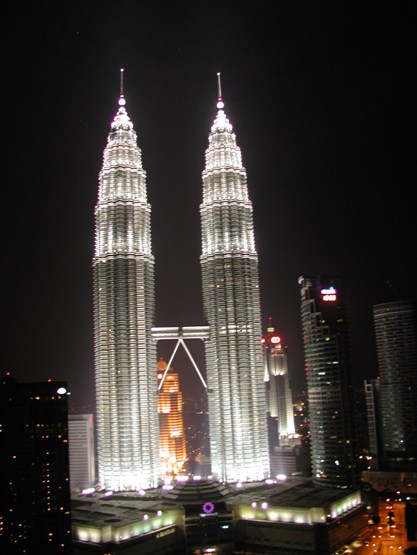
The Petronas Twin Towers lit up at night.
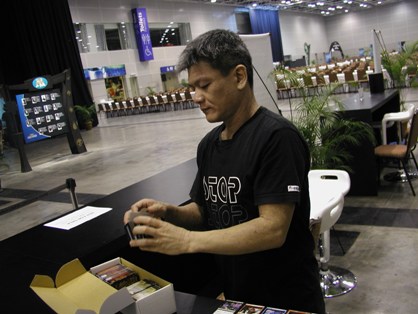
3D card artist Ookubo.
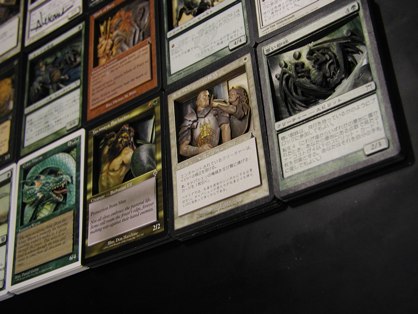
Some of his work.

